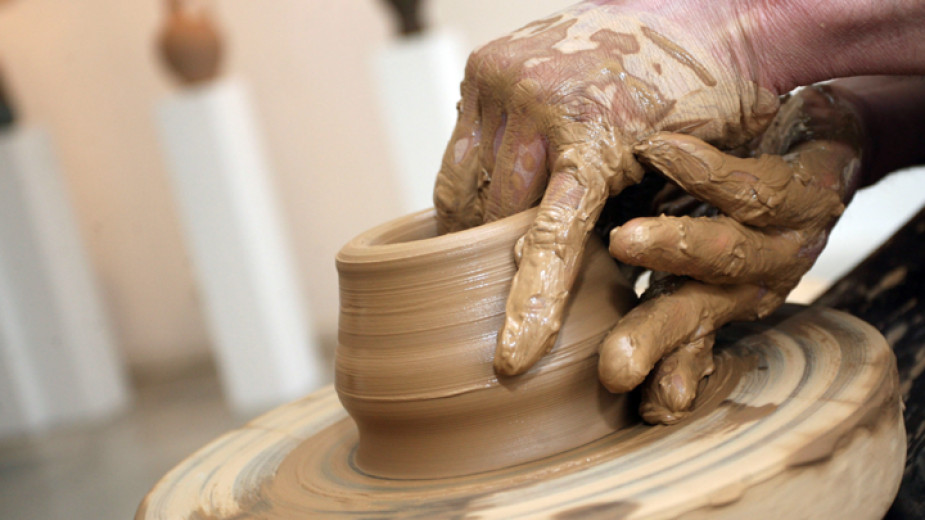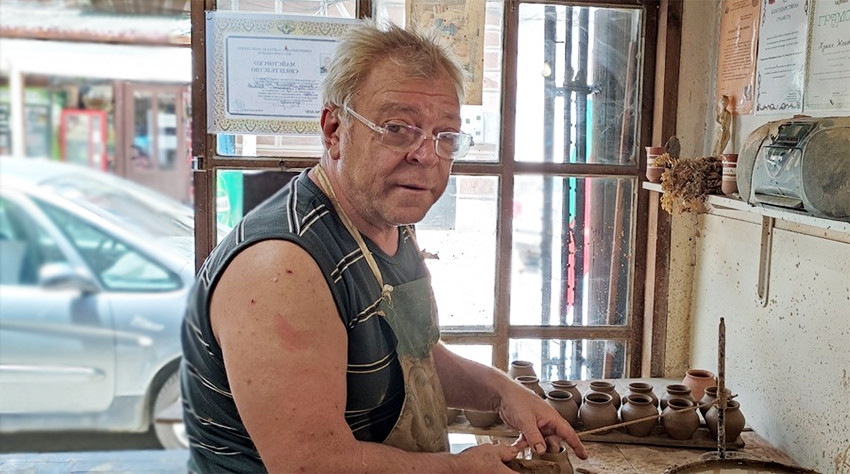 4
4
Traditional Bulgarian crafts have been passed down from generation to generation, from father to son, from master craftsmen to apprentice craftsmen. Unfortunately, there is a lack of continuity today and most crafts will vanish with the last local master craftsman.
“People neglected the handicrafts and rushed in crowds to earn their living, in order to survive”, said Mitko Mladenov, Chairman of the Regional Chamber Crafts in Vidin. In his words, some of the crafts in Bulgaria’s Northwest are on their last leg, forgotten by all institutions. “We are trying to do something, but we are getting nowhere”, Mitko Mladenov admitted. His chamber consists of 700 members, but only 37 or 38 of them are active and the rest don’t even have money to pay their membership contributions.
“About half of the handicrafts cannot be replaced by modern technologies, because manual-labor items have a heart and a soul” – Mitko Mladenov said in an interview for the BNR-Vidin.

Crafts such as pottery and carving, which are typical for this Bulgarian region, are falling into decay, because people don’t have enough money to buy their items. If we fail to support the last guardians of tradition, we will soon be speaking about this cultural heritage in past tense.
“In my view, the state is a stepmother of its people”–
Mitko Mladenov contends. We are required to buy cash registers. But how can a craftsman survive with a cash register, since it requires a regular service, an accountant, etc. This is yet another impediment to our business.
Are things any different in the bakery industry?
“These crafts are in most cases replaced by industry. The traditional hand-kneaded bread is almost absent from the market” – says Stiliyan Kamenov, Chairman of the Regional Chamber of Crafts in Montana. – There are two bakeries in Montana that knead bread using traditional recipes with sourdough. However, most bakeries are industrial and use the conveyor-belt method. There are a few traditional bakeries left and you can recognize the small bakeries by the long lines in front of them. They produce high-quality bread.

Currently, they are struggling to survive, because they are the most strongly affected by the energy crisis, because large bread producers dictate prices.”
In Stilyan Kamenov’s words, many people in Montana give up their traditional crafts. There is only one shoemaker and two watchmakers left in the town. However, the manufacture of boza (traditional fermented drink) is passed down from generation to generation. Tailoring workshops are becoming increasingly popular as well.

“The best thing is that people in our region have started to return to some old crafts and look for authentic and handmade products”, said potter Kuman Zhekov from the town of Vratsa who masters the sgraffito technique. He has passed on the craft to his daughter and has already trained several master craftsmen.
“I am far from thinking that crafts are stolen” – Kuman Zhekov said. – It is bad to steal a craft. Passing it down on you apprentices, who would develop and upgrade it, is the best think you can do. Because if they make the steps you have made, they will reach your level and will not upgrade the craft. That is why, I am calling on all craftsmen to give all their knowledge to young people.”

In Kuman Zhekov’s words, the apprentices suffer many deprivations before becoming master craftsmen. That is why, they need some money and here comes the role of the state. “Fellow craftsmen working abroad say that their governments help ancient crafts a lot”, Kuman Zhekov went on to say and expressed hopes that the future Bulgarian government would work towards saving this cultural heritage.
Compiled by: Diana Tsankova (Interviews by Plamen Kotsev- BNR-Vidin)
English version: Kostadin Atanasov
Photos: BGNES, Facebook / @kalibagrii, BNR- Vidin, library
Prayer served by His Holiness Bulgarian Patriarch Daniil on February 22, marks the beginning of the celebrations for the consecration of the new church "St. John of Rila" of the Bulgarian Orthodox community in London. For the..
"Thracians, Wine and Culture" is the theme of a seminar at the archaeological complex "Valley of the Thracian Kings" near Kazanlak , which brings together scholars and researchers from all over Bulgaria on February 22. This is the ninth edition of..
Help me do it myself, get me in touch with nature, take care of my immunity – these are the principles that the teachers at the Bulgarian kindergarten "Hristo Botev" in the Slovak capital Bratislava follow. The kindergarten has been operating since 2009..
The Martenitsa Festival was held in Brussels f or the third consecutive year . Cultural organizations from Bulgaria, Romania and Moldova presented their..
Exactly 3 years ago, on February 24, Russia’s invasion of Ukraine began – an event that woke up Europe 77 years after the end of World War II and called..

+359 2 9336 661
